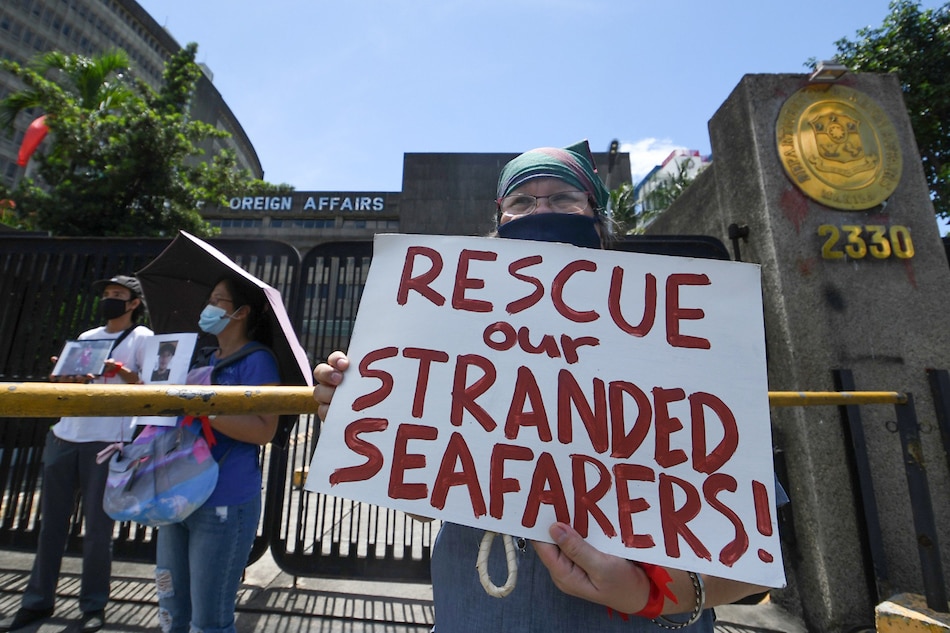PH remittances seen to drop 20 percent as ADB study assumes 'worst-case scenario'
ADVERTISEMENT

Welcome, Kapamilya! We use cookies to improve your browsing experience. Continuing to use this site means you agree to our use of cookies. Tell me more!
PH remittances seen to drop 20 percent as ADB study assumes 'worst-case scenario'
ABS-CBN News
Published Aug 04, 2020 05:58 PM PHT
MANILA - The Philippines may see remittances from overseas Filipinos drop 20.2 percent this year compared to 2018 levels because of the disruptions caused by the COVID-19 pandemic, according to a study by economists at the Asian Development Bank.
MANILA - The Philippines may see remittances from overseas Filipinos drop 20.2 percent this year compared to 2018 levels because of the disruptions caused by the COVID-19 pandemic, according to a study by economists at the Asian Development Bank.
The ADB study assumed a worst-case scenario where the pandemic would last a year.
The ADB study assumed a worst-case scenario where the pandemic would last a year.
“Because we see a second wave in many countries, like the Philippines, we feel the most realistic scenario is the worst case scenario,” said ADB senior economist James Villafuerte, who co-authored the study with economist Aiko Kikkawa Takenaka.
“Because we see a second wave in many countries, like the Philippines, we feel the most realistic scenario is the worst case scenario,” said ADB senior economist James Villafuerte, who co-authored the study with economist Aiko Kikkawa Takenaka.
This was a much sharper decline than the 5 percent drop forecast by the Bangko Sentral ng Pilipinas in June, but was still lower than the Labor Department’s 30 to 40 percent estimate.
This was a much sharper decline than the 5 percent drop forecast by the Bangko Sentral ng Pilipinas in June, but was still lower than the Labor Department’s 30 to 40 percent estimate.
ADVERTISEMENT
Villafuerte said their estimate was still on the “low side” as the economic impact of COVID-19 could last longer than a year.
Villafuerte said their estimate was still on the “low side” as the economic impact of COVID-19 could last longer than a year.
He said their study also did not cover other factors such as the impact of death and disability on migrant workers, the impact on the cost of sending remittances, changes to migration-related policies as countries try to restrict the entry of foreigners with existing work visas within their borders, and possible similarity in the impact of COVID-19 on jobs among local and migrant workers within and across sectors and economies.
He said their study also did not cover other factors such as the impact of death and disability on migrant workers, the impact on the cost of sending remittances, changes to migration-related policies as countries try to restrict the entry of foreigners with existing work visas within their borders, and possible similarity in the impact of COVID-19 on jobs among local and migrant workers within and across sectors and economies.
A study done by researchers with the Japan International Cooperation Agency, which was cited by ADB economists, forecasts Philippine remittances falling by 23 to 32 percent in 2020 relative to levels before the pandemic due to economic shocks in host economies.
A study done by researchers with the Japan International Cooperation Agency, which was cited by ADB economists, forecasts Philippine remittances falling by 23 to 32 percent in 2020 relative to levels before the pandemic due to economic shocks in host economies.
Consequently, household spending per capita will be reduced by 2.2 to 3.3 percent, the JICA study said.
Consequently, household spending per capita will be reduced by 2.2 to 3.3 percent, the JICA study said.
The ADB said that in Southeast Asia, the Philippines was the most affected country in terms of drop in remittances. It also noted that remittances make up more than 10 percent of the Philippines’ gross domestic product.
The ADB said that in Southeast Asia, the Philippines was the most affected country in terms of drop in remittances. It also noted that remittances make up more than 10 percent of the Philippines’ gross domestic product.
The ADB however also said that while the Philippines is one of the largest recipients of remittances, it was not as dependent on this as other countries like Laos, Bangladesh, and even Fiji, and Samoa.
The ADB however also said that while the Philippines is one of the largest recipients of remittances, it was not as dependent on this as other countries like Laos, Bangladesh, and even Fiji, and Samoa.
Globally, remittances will decline by $57.6 billion with $31.4 billion lost in Asia alone, assuming the disease is contained within 6 months, according to the ADB study. If the pandemic lasts a year or longer, Asia could lose a total of $54.3 billion in remittances.
Globally, remittances will decline by $57.6 billion with $31.4 billion lost in Asia alone, assuming the disease is contained within 6 months, according to the ADB study. If the pandemic lasts a year or longer, Asia could lose a total of $54.3 billion in remittances.
---With a report from Warren de Guzman, ABS-CBN News
ADVERTISEMENT
ADVERTISEMENT



